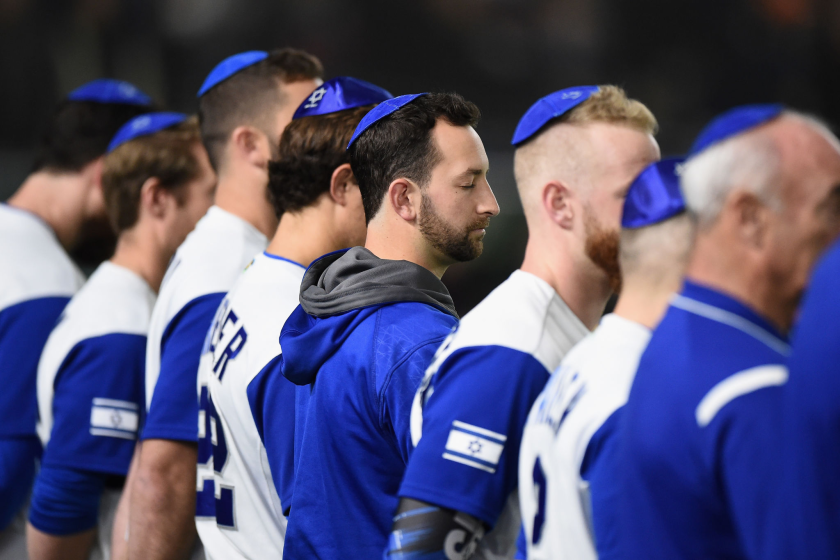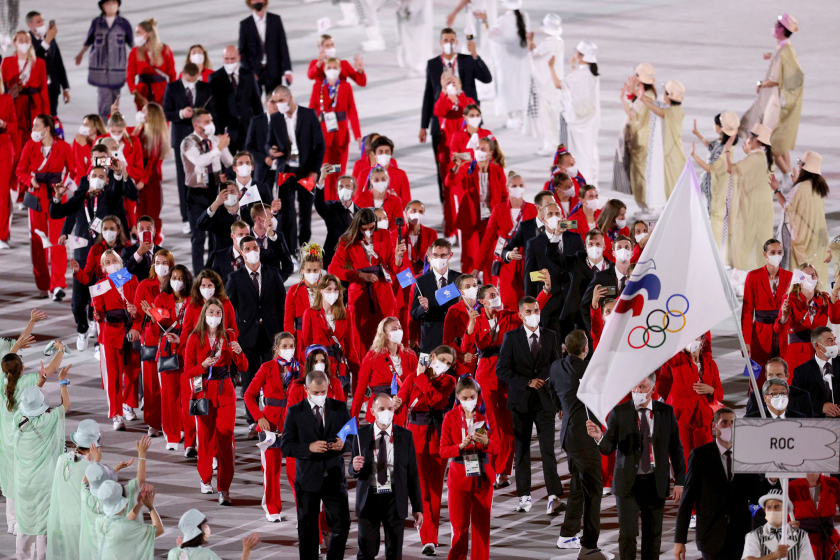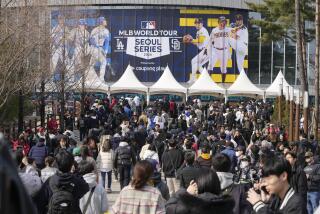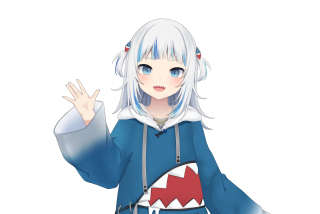Even for athletes with family in Tokyo, separation remains part of these Olympics
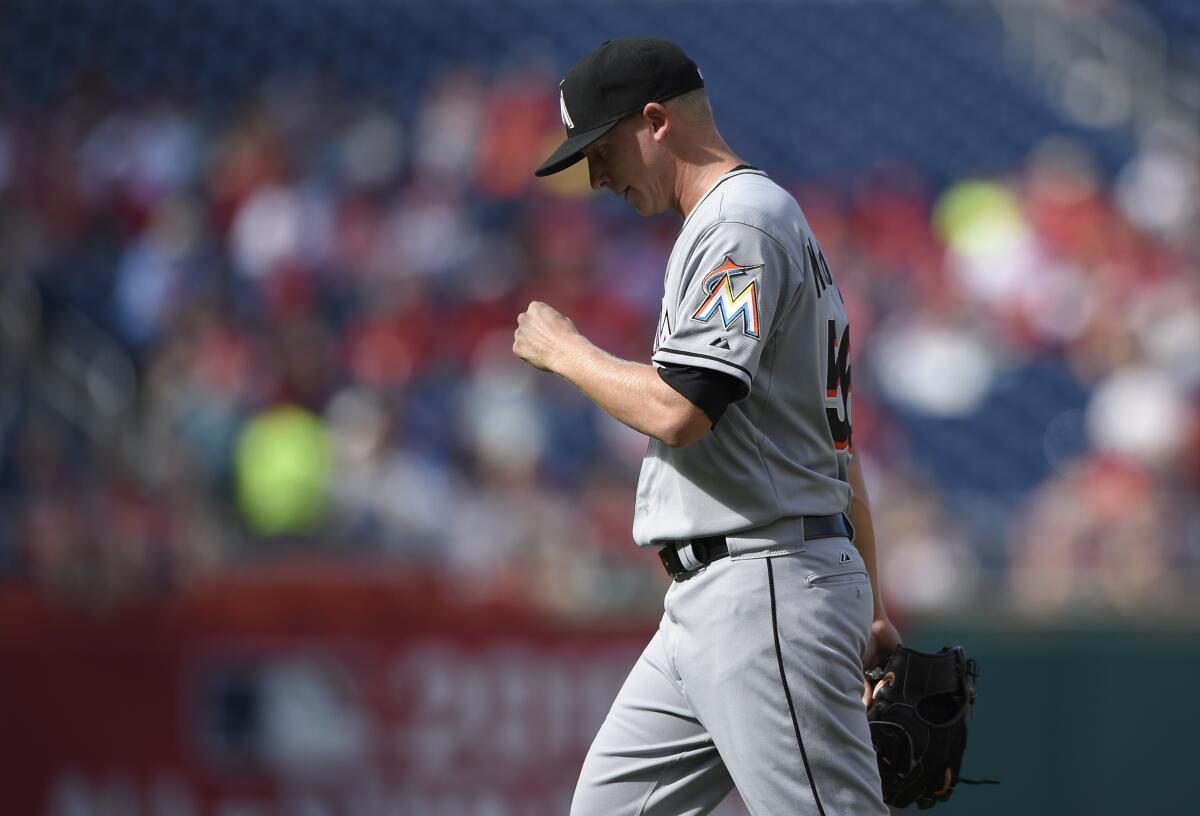
- Share via
TOKYO — Lauren McGough left her Tokyo apartment with her 10-month-old daughter Dakota on Wednesday on a mission to see her husband, Scott. They took the train for six stops before jumping into a taxi for a 10-minute ride. The five-mile trip took 25 minutes.
Lauren hoped they’d get close enough to have Scott, a pitcher for the U.S. baseball team, wave at them from across Tokyo Bay. But she couldn’t see him when they reached a gate to the Olympic village. Barriers blocked the view. They settled for a FaceTime session.
“That’s about as much Olympic fun as any family member will be having, I guess,” Lauren McGough said.
Most foreign athletes in these Games don’t have close relatives in the country after foreigners were barred from entering Japan to control the spread of the novel coronavirus. There are just a few known exceptions among Team USA’s delegation of 613 athletes.
Gymnast Jade Carey’s father, Brian, made the trip as her coach. At least two swimmers — Brooke Forde and Michael Andrew — have their fathers in Tokyo. Forde’s father, Pat, is a writer for Sports Illustrated. Andrew’s father, Peter, is an assistant coach for the U.S. team. Forde is allowed to see her father in the mixed zone from six feet away. Andrew and Carey’s fathers are in the Olympic village.
Scott McGough is in another category; his wife and daughter are in the country, but they’re not permitted near him until he leaves the Olympic village for good. He left his wife and daughter at their Tokyo residence and entered the Olympic village last Thursday. He considers himself fortunate.
“It’s been difficult, but you can’t be too angry about that,” McGough said. “A lot of the guys have been asking me, like, ‘Hey, how did your wife do it? What can my family do?’”
McGough, a 31-year-old right-hander, is an exception because his wife and daughter were given a medical exemption to enter the country last month that traces back to last year.
McGough has played for the Yakult Swallows for the last three seasons. Lauren was already with him in Japan last year when the coronavirus began spreading, forcing the country into a shutdown. She left for the United States last August to give birth to Dakota. That was considered a medical reason and — after paperwork trouble nearly derailed her hopes of returning this year — she was afforded reentry even during the pandemic.
Lauren and Dakota landed on June 28. They were subject to a three-day quarantine in a Japanese government hotel in Yokohama before continuing the quarantine for 11 more days at their apartment in Tokyo. The Swallows didn’t allow McGough to be with them until the quarantine ended, so he crashed at teammate Albert Suarez’s apartment.
Most other foreign players in the Nippon Professional Baseball league are in Japan without their families.
Nick Martinez and Tyler Austin, the other two players in the Japanese league on the U.S. roster, don’t have their families in Japan. Austin said his wife could receive clearance to join him, though he didn’t know when or the reason for the potential change to her entry status.
Last month, former Major League Baseball All-Star first baseman Justin Smoak, a marquee offseason free-agent acquisition for the Yomiuri Giants, left the team in the first year of a two-year, $6 million contract to return to the U.S. to be with his wife and two daughters.
For a team making its Olympics debut, Israel’s baseball team is embracing lofty ambitions as it tries to generate more interest in the sport.
This week, after thousands of foreigners entered the country for the Olympics, Seibu Lions first baseman Ernesto Mejía announced he wouldn’t return to the club after the league’s Olympic break because he couldn’t bring his family with him.
“This is just a difficult situation for everyone,” McGough said. “Some things don’t make sense to me. ... But who am I to decide that? I’m not a doctor. I’m not seeing the case numbers and I’m not doing that stuff. So I just leave that to the experts and just play ball.”
Taken by the Dodgers in the fifth round of the 2011 draft, McGough broke into the majors with the Miami Marlins in 2015. He appeared in six games and hasn’t made it back to the big leagues. He’s having his best season in Japan this year, posting a 2.39 earned-run average in 39 games for the Swallows. The performance earned him an All-Star selection.
What the heck is the ROC? Well, it’s Russian athletes in every aspect except a flag and anthem. Here’s why the name is being used at the Tokyo Olympics.
Lauren and Dakota were able to attend the first of two All-Star games. It was held at MetLife Dome, about an hour from their apartment, and they were two of the 8,992 fans in attendance. It was the first time Dakota ever watched her dad pitch in person. Lauren said they would’ve gone to the second game too, if the trip to Rakuten Seimei Park Miyagi — more than four hours each way — wasn’t so long.
They aren’t allowed to watch Scott pitch in person in the Olympics, but the mother and daughter traveled the hour down to Yokohama Stadium on Friday afternoon to see Team USA arrive for their Olympic opener against Israel. They waited outside of the stadium, near where buses drop off the teams. This time, they caught a glimpse of Scott. They waved before returning to Tokyo to watch the Americans’ 8-1 win on television.
More to Read
Go beyond the scoreboard
Get the latest on L.A.'s teams in the daily Sports Report newsletter.
You may occasionally receive promotional content from the Los Angeles Times.


